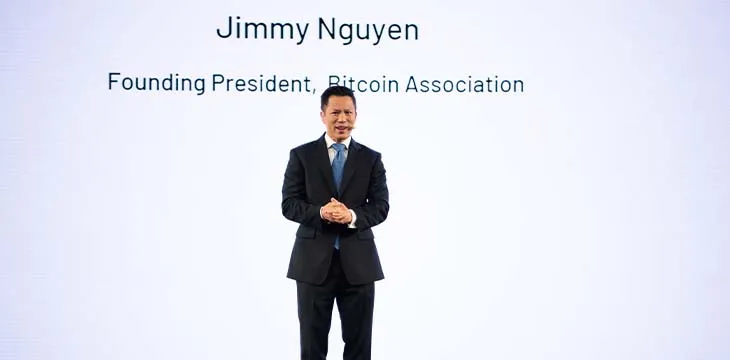|
Getting your Trinity Audio player ready...
|
The Founding President of the BSV Blockchain Association, Jimmy Nguyen, recently talked to AusBiz host Andrew Geoghegan about BSV and Satoshi Nakamoto’s vision. Check out the conversation via the link or read the summary below.
Bitcoin Association for BSV
Nguyen begins by answering a question about what the Bitcoin Association is and what it does. He responds that it’s a global non-profit organization that supports Bitcoin SV. He explains that the Bitcoin Association is dedicated to helping fulfill Satoshi’s original vision; to create a scalable peer-to-peer electronic cash system. The Bitcoin Association helps with growth, policy, education, business opportunities, and much more.
What happened to Satoshi’s vision? How was it lost?
Geoghegan then asks a quick and pointed question: What happened to Satoshi’s vision? Why has it been lost along the way with BTC?
Nguyen explains how the BTC chain simply didn’t scale. He points out that Satoshi Nakamoto always said Bitcoin wouldn’t hit a scaling ceiling but that BTC small blockers had deliberately kept the block size small. This decision resulted in it only being able to do seven transactions per second. He emphasizes that this is nowhere near the capacity required to challenge existing payment systems like Visa and Mastercard. These decisions have also made it extremely expensive to transact on BTC, with fees between $1 and $40 per transaction being the norm.
By contrast, BSV’s mission is to scale much larger. Due to its design, it can handle far more payments and data transactions. The cost per transaction ranges from 1/20th to 1/100th of a cent, fulfilling Satoshi’s vision to make Bitcoin the most efficient way to send payments across the internet, including tiny amounts.
Has BSV addressed the blockchain trilemma of decentralization, scalability, and security?
Nguyen begins by addressing scalability, noting that it is the biggest problem for blockchains like Ethereum. This has led to a congested blockchain with high fees between $20 and $60.
He then outlines how BSV has solved scaling by following Satoshi’s white paper and via world-class research and development. BSV also uses Simplified Payment Verification to scale to global dimensions, meaning not everybody has to keep a copy of the entire blockchain but rather can retain copies of the block headers relevant to their own transactions. With Teranode coming later this year, BSV will be able to handle at least 50-100k transactions per second.
Moving on to security, Nguyen explains how BSV’s node software was subject to an audit by an outside security firm. Furthermore, he points out that increasing the block size does not impact security. However, he concedes that bigger blocks make it more expensive to run nodes and that this renders it difficult for home users to mine effectively.
Why is this seen as a problem by so many early Bitcoiners? Some see big blocks as the pathway to centralizing power among big corporations. However, Nguyen points out that this has already happened on the BTC network. Four or five big mining pools control more than half of the hash rate, and we’re all familiar with images of the massive server farms full of mining rigs.
Will BSV run parallel with BTC, or is it an alternative?
Nguyen says that he doesn’t engage in this debate too often because the two are so different. He points out that BTC developers have no intention of making it an on-chain payments system, nor do they have any plans to offer things like smart contracts or blockchain-based computation.
On the other hand, the BSV vision is to become a distributed data network that operates in parallel with the internet. “Our vision is so different to what BTC has become,” Nguyen says.
On the price difference between BSV and BTC
Geoghegan asks why there’s such a big difference between the price of the BTC and BSV tokens.
The answer, according to Nguyen, is partly to do with attacks on the BSV network and part of it has to do with BSV being repressed by exchanges and other parts of the digital asset industry. That said, he believes BSV is undervalued and that the utility of what’s being built on it means it will win out.
“Scale and utility are all that matters,” Nguyen says.
He points out that the markets are all about speculation right now, and while that’s fine, the more important thing is how blockchain technology can change the world and improve our lives.
Watch: CoinGeek New York presentation, BSV Technical Update

 09-02-2025
09-02-2025 





